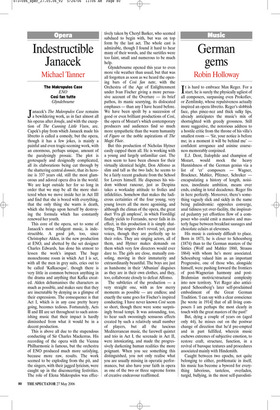Indestructible Janacek
Michael Tanner
The Makropulos Case ENO Cosi fan tutte Glyndebourne Janacek’s The Makropulos Case remains a bewildering work, as in fact almost all his operas after Jenufa, and with the exception of The Cunning Little Vixen, are. Capek’s play from which Janacek made his libretto is called a comedy, but the opera, though it has a few jokes, is mainly a painful and even tragic-seeming work, with an enormous, perhaps unique, amount of the paralysingly prosaic. The plot is grotesquely and designedly complicated, all its elaborations being cut through by the shattering central donnée, that its heroine is 337 years old, still the most glamorous and adored opera diva in the world. We are kept outside her for so long in order that we may be all the more shattered when we move inside her in Act III and find that she is bored with everything, that the only thing she wants is death, which she brings upon herself by destroying the formula which has constantly renewed her youth.
This core of the opera, set to some of Janacek’s most refulgent music, is indestructible. A good job, too, since Christopher Alden, in the new production at ENO, and abetted by the set designer Charles Edwards, has done his utmost to lessen the work’s impact. The huge monochrome room in which Act I is set, with all the men in grey suits, cries out to be called ‘Kafkaesque’, though there is very little in common between anything in the drama and anything that Kafka created. Alden dehumanises the characters as much as possible, and makes sure that they are inscrutable by denying us a glimpse of their expressions. The consequence is that Act I, which is in any case pretty heavy going, becomes tedious. Fortunately, Acts II and III are set throughout to such astonishing music that their impact is hardly diminished from what it would be in a decent production.
This is above all due to the stupendous conducting of Sir Charles Mackerras. His recording of the opera with the Vienna Philharmonic is famous, but the orchestra of ENO produced much more satisfying, because more raw, results. The work seemed to be exploding from the pit, and the singers, with their jagged lyricism, were caught up in the disconcerting festivities. The role of Elena Makropulos was effec tively taken by Cheryl Barker, who seemed subdued to begin with, but was on top form by the last act. The whole cast is admirable, though I found it hard to hear many of their words, and the surtitles were too faint, small and numerous to be much help.
Glyndebourne opened this year to even more vile weather than usual, but that was all forgotten as soon as we heard the opening bars of Cos! fan tutte, with the Orchestra of the Age of Enlightenment under Ivan Fischer giving a more persuasive account of the Overture — its brief pathos, its manic scurrying, its dislocated emphases — than any I have heard before. We have been spoilt by a succession of good or even brilliant productions of Cos!, the opera of Mozart’s which contemporary producers and audiences find so much more sympathetic than the warm humanity of Figaro or the noble aspirations of The Magic Flute.
But this production of Nicholas Hytner easily capped them all. He is working with a young and largely unfamiliar cast. The men seem to have been chosen for their virtually identical height, Don Alfonso as slim and tall as the two lads; he seems to be a fairly recent graduate from the School for Lovers himself. He dispenses his wisdom without rancour, just as Despina takes a workaday attitude to frolics and infidelities. Somehow that makes the ludicrous certainties of the four young, very young lovers all the more agonising, and although the climax of the opera, the great duet ‘Fra gli amplessi’, in which Fiordiligi finally yields to Ferrando, never fails in its effect, in this production it is simply shattering. The singers don’t reveal, yet, great voices, though they are perfectly up to their roles. They are singing actors, all of them, and Hytner makes demands on them which very few directors would ever dare to. The girls are close, mutually consoling, moving in their immaturity and extraordinarily beautiful. The boys are just as handsome in their ‘Albanian’ disguises as they are in their own clothes, and they, too, collaborate closely to defeat Alfonso.
The subtleties of the production — a very straight one, with as few merry moments as possible — are endless; and exactly the same goes for Fischer’s inspired conducting. I have never known Cos! seem so short, though there were some surprisingly broad tempi. It was astounding, too, to hear such swooningly sensuous effects created by such a relatively small number of players, but all the luscious Mediterranean music, the farewell quintet and trio in Act I, the serenade in Act II, were intoxicating, and made the progressively darkening human realities the more poignant. When you see something this distinguished, you not only realise what you are usually missing in operatic performances, but also have your faith in opera as one of the two or three supreme forms of creative endeavour reaffirmed.










































































































 Previous page
Previous page